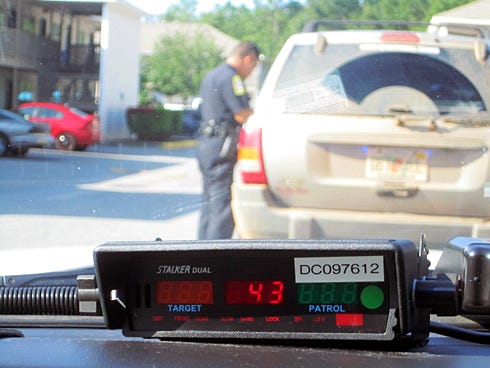
CRESTVIEW — The state Legislature's passage of the "Waldo Bill," which prohibits Florida communities from establishing traffic ticket quotas, has little effect in Crestview, according to police.
The Crestview Police Department doesn't require its officers to write a minimum number of tickets, said Lt. Andrew Schneider, who's been with the CPD for 15 years. "If they did, it was several decades ago," he said. "We've never had a quota as long as I've been here."
The bill — which would take effect in July, with Gov. Rick Scott's approval — was named for Waldo, an Alachua County community of about 1,000 people. The American Automobile Association last year identified the town as one of the country's two most notorious speed traps. Former Waldo Police officers revealed a ticket quota scheme and vigorous speed enforcement program that netted the community more than half its annual town budget.
The Waldo Bill (SB 264), which passed the House 116-1 states, "A traffic enforcement agency may not establish a traffic citation quota." The bill also requires a city or county to report to the Legislative Auditing Committee if ticket revenue exceeds 33 percent of law enforcement agency operating costs.
Because a law enforcement agency issuing a traffic citation receives less than $3 back from the state, "it is not a revenue-generator," Crestview city attorney Jerry Miller said.
Crestview Police Chief Tony Taylor said individual officers issue traffic tickets at their discretion; like radar and DUI checkpoints, tickets are just part of overall traffic regulation enforcement. "Our job is to enforce the laws, and traffic citations are a tool we use to do that," he said.
"It's a lot of work for our officers, and the city's not making anything off it," Mayor David Cadle said.
City Clerk Betsy Roy said identifying what little the city receives from traffic tickets is difficult. "Anything we get from the county is all lumped into one fund. We have no way of separating it out," she said. "We just get a check made out to 'fines and forfeitures.' It's not a very significant amount."
The city receives about $3,000 per month in police fines; most of it is from traffic citations, Roy said.
Email News Bulletin Staff Writer Brian Hughes, follow him on Twitter or call 850-682-6524.
This article originally appeared on Crestview News Bulletin: 'Waldo Bill' has little effect on Crestview traffic tickets
